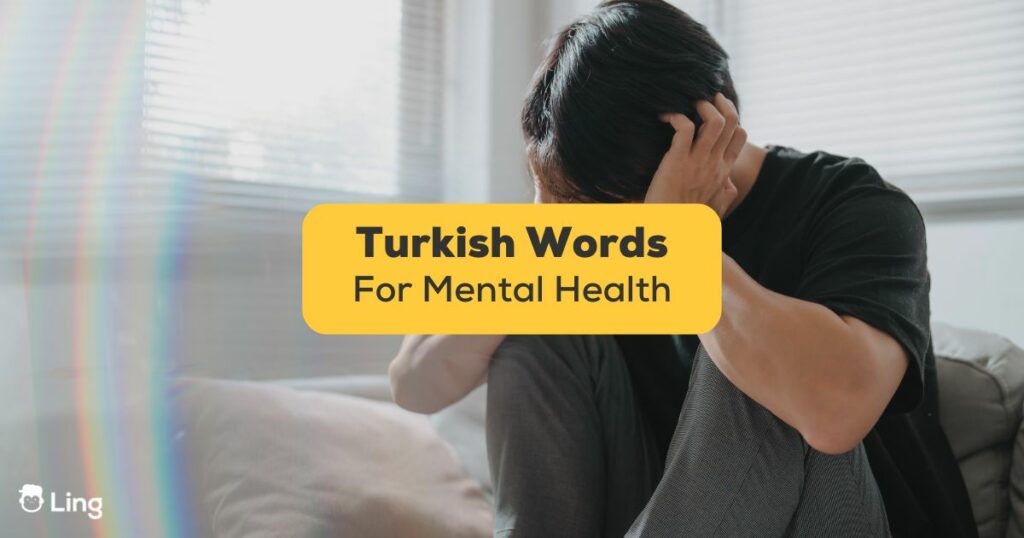No matter what language we speak, it’s important to talk about mental health to understand one another better.
If you are a Turkish learner, knowing some Turkish words for mental health can be useful. You can contribute to spreading empathy and understanding as you learn to talk about this sensitive topic in the Turkish language. Here is a tiny reminder; mental health is a critical and sensitive topic so make sure you speak gently and feel empathy.
How To Say Mental Health In Turkish?
Let’s start with learning the essential words and phrases related to mental health! Here are the most common Turkish words for mental health with English translation:
| English | Turkish |
|---|---|
| Mental health | Zihinsel sağlık |
| Mental health problems | Zihinsel sağlık sorunları |
| Mental health consultation | Zihinsel sağlık danışmanlığı |
| Mental health counselor | Zihinsel sağlık danışmanı |
| Mental health facilities | Zihinsel sağlık tesisleri |
| Mental health Hotline | Zihinsel sağlık yardım hattı |
| Mental health services | Zihinsel sağlık hizmetleri |
Common Turkish Words For Mental Health
After learning essential phrases, now let’s learn some common Turkish words and terms related to mental health issues:
| English | Turkish |
|---|---|
| Anxiety | Anksiyete, kaygı |
| Stress | Stres |
| Depression | Depresyon |
| Panic disorder | Panik bozukluk |
| Bipolar disorder | Bipolar bozukluk |
| Schizophrenia | Şizofreni |
| Dementia | Bunama |
| Well-being | Sağlık, iyi olma hali |
| Psychotherapy | Psikoterapi |
| Mental Health | Zihinsel Sağlık |
| Self-Care | Kişisel Bakım |
| Therapy | Terapi |
| Support Help | Destek Yardımı |
| Isolation | İzolasyon |
| Hope | Umut |
| Acceptance | Kabul |
| Panic attack | Panik atak |
| Psychological | Psikolojik |
| Emotional well-being | Duygusal sağlık |
| Treatment | Tedavi |
| Mental health specialist | Ruh sağlığı uzmanı |
| Psychiatrist | Psikiyatrist |
| Psychologist | Psikolog |
| Mental health center | Ruh sağlığı merkezi |
| Mental disorder | Ruhsal bozukluk |
| Coping mechanisms | Başa çıkma mekanizmaları |
| Support group | Destek grubu |
| Self-esteem | Özsaygı |
| Resilience | Dayanıklılık |
| Mindfulness | Farkındalık |
| Meditation | Meditasyon |
| Relaxation techniques | Rahatlama teknikleri |
| Social support | Sosyal destek |
| Coping skills | Başa çıkma becerileri |
| Emotion regulation | Duygu düzenlemesi |
| Cognitive-behavioral therapy (CBT) | Bilişsel-davranışçı terapi (BDT) |
| Medication | İlaç tedavisi |
Is Depression Common In Turkish Society?
Depression is a global issue affecting people of all cultures and backgrounds, including Turkish society. While cultural factors can influence how depression is perceived and expressed, studies suggest that depression is indeed common in Turkey, as it is in many other countries. Factors such as economic instability, social pressures, and rapid urbanization can contribute to the prevalence of depression in Turkish society.
However, it’s important to note that mental health awareness and access to mental health services are increasing in Turkey, which can help in addressing and managing depression.

Turkish Phrases For Discussing Mental Health Issues
Here are the most common Turkish phrases used when talking about mental health or when talking to a person with mental issues such as depression and anxiety:
| English Phrase | Turkish Translation |
|---|---|
| Are you feeling well lately? | Son zamanlarda kendini iyi hissediyor musun? |
| I have depression. | Ben depresyondayım. |
| I feel my heart beating very fast. (for those who have panic disorder) | Kalbimin çok hızlı attığını hissediyorum. (Panik bozukluğu olanlar için) |
| I want to do psychotherapy. | Psikoterapi yapmak istiyorum. |
| When I get older I’m afraid I’ll have dementia. | Yaşlandığımda bunamanın olacağından korkuyorum. |
| You’re not crazy, you’re just sad. | Sen deli değilsin, sadece üzgünsün. |
| I don’t know how bad you felt. But I’m willing to understand you. | Ne kadar kötü hissettiğini bilmiyorum. Ama seni anlamak istiyorum. |
| You’ll be better soon. | Yakında daha iyi olacaksın. |
| How can I help you? | Sana nasıl yardımcı olabilirim? |
| You’re not alone. | Yalnız değilsin. |
| Talk to me, please. | Konuş benimle lütfen. |
| Take care of your mental health. | Zihinsel sağlığına iyi bak. |
| You mean a lot to me. | Sen benim için çok şey ifade ediyorsun. |
| Try to explain your mental health issues. | Zihinsel sorunlarını açıklamayı dene. |
| I am trying to understand you. | Seni anlamaya çalışıyorum. |
| I am always there for you. | Her zaman yanındayım. |
| I need your help. | Yardımına ihtiyacım var. |
Tips For Talking About Mental Health
When talking about topics related to mental health and well-being, it is crucial to choose words that convey understanding and empathy. Here are some tips for using gentle language when engaging with someone going through mental health issues:
- One of the key considerations when talking about mental health is showing compassion and empathy through the choice of words.
- When communicating, it is crucial to avoid the use of stigmatizing terms such as “crazy” (deli), as they can be offensive and hurtful.
- When offering emotional support to someone, it is crucial to communicate in a non-judgmental manner, ensuring that they feel understood and respected without intruding on their boundaries. You can use empathetic phrases such as “I’m here to listen” (Seni dinlemek için buradayım.) to show your willingness to support them.
- Respect the preferences of individuals when it comes to discussing mental health. It’s important to acknowledge and honor the fact that everyone has different comfort levels when it comes to opening up about their mental health issues.
Ready For More Turkish Words?
Learning Turkish words for mental health isn’t just about picking up new vocabulary; it’s about connecting with others on a deeper level and showing kindness. By knowing these words, you’re not just speaking a language, you’re reaching out to understand people’s struggles and offering support. As we talk openly and respectfully about mental health, we chip away at the stigma and build a more caring community. So, let’s keep the conversation going, keep listening, and keep supporting each other through thick and thin.
Want to learn more Turkish vocabulary? By learning more Turkish words, you can dive into a whole new world of conversation topics in everyday life. So, why don’t you give the Ling app a chance to improve your Turkish skills?


































































